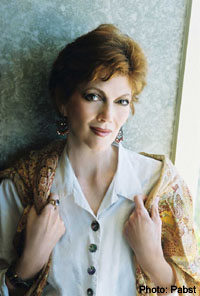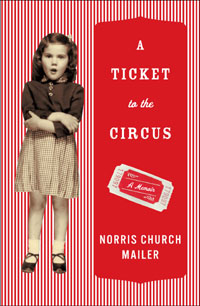The plot could have come straight from a bodice-ripper: she was a stunning young art teacher from Arkansas; he was a notoriously macho New York author twice her age. Hoping for an autograph, she cadged an introduction, and sparks flew. In A Ticket to the Circus, Norris Church Mailer (nee Barbara Jean Davis) tells the story of her thirty-two-year love affair with and marriage to Norman Mailer, the American writer as famous for his peccadilloes (six wives, eight children, and dozens of mistresses) as for his Pulitzers (two).
Despite her youth and provincial upbringing, Norris was never a mere babe in the woods. When she met Mailer as an impossibly gorgeous twenty-six-year-old, she was a divorced single mother, who’d already notched her belt with one infamous ladies’ man (the young Bill Clinton). But life with Norman Mailer required Norris to hide her light under a bushel in a way that Arkansas never did. That she managed to find fulfillment and fun while in the shadow of her famous, larger-than-life husband is a testament to her strength of character. Being Norman Mailer’s wife could not have been easy; to Norris’s immense credit, she shows an enviable ability to detach and rise above his many indiscretions. Throughout the book, her constancy and resilience are impressive.
 Especially in recent years—in 1999 she was diagnosed with a rare, usually swiftly fatal cancer—her strength and bravery give the lie to her beauty-queen looks. It’s obvious what a tough guy like Mailer saw in her; the question is, what did she see in him? Norris answers with characteristic wit and honesty: “Through the years, no matter the circumstances of our passions and rages, our boredoms, angers and betrayals large and small, sex was the cord that bound us together; it was the thick wire woven from thousands of shared experiences that never broke, indeed was hardly frayed and only got stronger, no matter how the bonds of marriage were tested. Even in the worst times…somehow, inexplicably, at night we would cling to each other, drawn like powerful magnets, the familiarity of our bodies putting salve on the wounds we had inflicted during the day, until over time the warring ended and the love remained. The only thing that finally brought it to an end was old age, illness, and death itself.”
Especially in recent years—in 1999 she was diagnosed with a rare, usually swiftly fatal cancer—her strength and bravery give the lie to her beauty-queen looks. It’s obvious what a tough guy like Mailer saw in her; the question is, what did she see in him? Norris answers with characteristic wit and honesty: “Through the years, no matter the circumstances of our passions and rages, our boredoms, angers and betrayals large and small, sex was the cord that bound us together; it was the thick wire woven from thousands of shared experiences that never broke, indeed was hardly frayed and only got stronger, no matter how the bonds of marriage were tested. Even in the worst times…somehow, inexplicably, at night we would cling to each other, drawn like powerful magnets, the familiarity of our bodies putting salve on the wounds we had inflicted during the day, until over time the warring ended and the love remained. The only thing that finally brought it to an end was old age, illness, and death itself.”
Chapter 16: You started writing your first book, Windchill Summer, in a creative-writing class while you were still married to your first husband—long before you met Norman Mailer. Years later you resumed working on the book, but Norman’s comments after reading the first hundred pages, you write, “took away any illusions I’d had that I could seriously write.” You shelved the book for twenty years and focused instead on painting. What made you take the book out, dust it off, decide to finish it, and then decide to write another (Cheap Diamonds) and a memoir to boot?
Mailer: If I had really wanted to continue the first novel I would have, in spite of what Norman said, but writing is a solitary activity, and those were heady years, those first years here in New York when I was young. I also wanted to model, then I was seriously painting and having shows every year and doing commissioned portraits, not to mention taking care of the children and enjoying a lively social life. I fell into acting through Norman’s play Strawhead at the Actors Studio (I played Amy Greene), and then I began writing plays, two of which were produced at the Studio. I directed one of Norman’s plays there, he directed me, we had a great time. Along the way, I wrote a magazine piece for Cosmo, and there were the myriad of letters Norman and I wrote to each other. (As I said in the book, if I had something serious to tell him, I would write him a letter, that way he would be sure to understand the nuance of what I was saying.) He knew I was a good writer, and he suggested we write a screenplay together, which we did. I did the research and wrote the first draft; then we worked together polishing it. We sold it and then went on to write two others together, all of which we sold, none of which got made. But the novel was still rattling around in the back of my head, so, after we finished the third screenplay and I was a little bit at loose ends, I began the old story all over again, as a novel (without telling him) and it was published in 2000.
Chapter 16: Though you edited and read Norman’s work, you refused to let him touch yours. “I know there were a lot of people who would have given three years of their lives if Norman Mailer would have edited their manuscripts, but I was not one of them,” you write in A Ticket to the Circus. Can you explain why this was so important to you?
Mailer: Norman edited the Cosmo piece I wrote, and even today I can pick out every single one of the words he added to it. Our styles are so totally different that it was ultimately impossible to work together, although we did do three screenplays. I wanted my books to be my own words, my own voice, and I didn’t want anyone thinking my husband had written it for me. It was better he had nothing at all to do with it, and if it succeeded or failed, it would be all my own doing.
Chapter 16: You’ve chosen to publish some pretty steamy love letters—both Norman’s to you and yours to Norman—that are a testament to the physical passion between the two of you. Why was it important to you to convey that side of your relationship?
Mailer: I’m amused by people’s reaction to those letters. Maybe I am jaded from living with Norman and his sexual language all these years, but to me they are beautiful letters, not pornographic or graphic or ugly. I wanted to tell the story of our life, of our love affair, of our relationship with its ups and downs, and it was passionate beyond belief, not only in the beginning, but all through the years in varying levels. I chose to include the letters because they convey his feelings for me better than I could summarize, and, finally, they were just so beautiful; if you have a Picasso you don’t put it in the closet. I feel sorry for any woman who never gets the kind of love letter Norman wrote to me. No matter what else you choose to believe about our life, I was loved.
 Chapter 16: At the end of one of Norman’s letters, he suggests that you read D.H. Lawrence’s The Rainbow. Did you often recommend books to one another? Did the two of you share similar literary tastes?
Chapter 16: At the end of one of Norman’s letters, he suggests that you read D.H. Lawrence’s The Rainbow. Did you often recommend books to one another? Did the two of you share similar literary tastes?
Mailer: No, I was not nearly as literary or erudite as Norman. It is a chore for me to read poetry, which he loved. I like to relax with a good mystery by a British woman writer like PD James or Ruth Rendell, even Agatha Christie; I am eclectic in my tastes and love good literary fiction, while he hardly read any contemporary writers at all. I once told him that as a Christmas gift to him I would read Proust, and after the first volume I couldn’t read the second. I found the whole cast of characters so tiresome and vapid, especially that empty head, Odette, and the slow pacing irritated me. I might pick it up again now, though; maybe since I’m older I have more patience.
Chapter 16: You are obviously a wonderful stepmother to Norman’s whole extended brood of children, which is extraordinary, especially considering that his oldest daughter is only six months younger than you are. How did you manage to get along so well with all his children, and even with many of his ex-wives and ex-girlfriends?
Mailer: I have asked a few of the kids that question recently, as it has been coming up, and a couple of them said that their lives had been so chaotic with a long succession of step-mothers and fights and girlfriends and personal upheavals, that I was someone they could just relax and have fun with. I was close in age to them, we liked each other, we played together, and the older girls were like my sisters. Their father was happier than he had been in years, and there was fun in the family. I was friendly, and am still, with some of the ex-wives, but I wouldn’t say any of the ex girlfriends were on my list of friends.
Chapter 16: What is your greatest wish for the future—literary, creative or personal? What comes after being “the last wife of Norman Mailer”?
Mailer: I’d like to just have a future, given my health concerns, and write another book or a few, see what my kids and grandkids turn out to be like, and just keep on loving and being loved by this incredible family. Oh—and world peace.
Norris Mailer will appear at Davis-Kidd Booksellers in Memphis on April 6 at 6 p.m.
Tagged: Nonfiction





